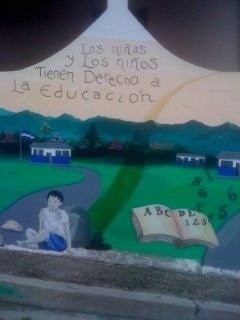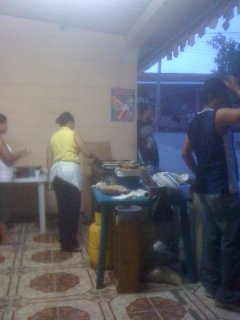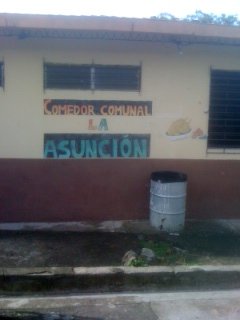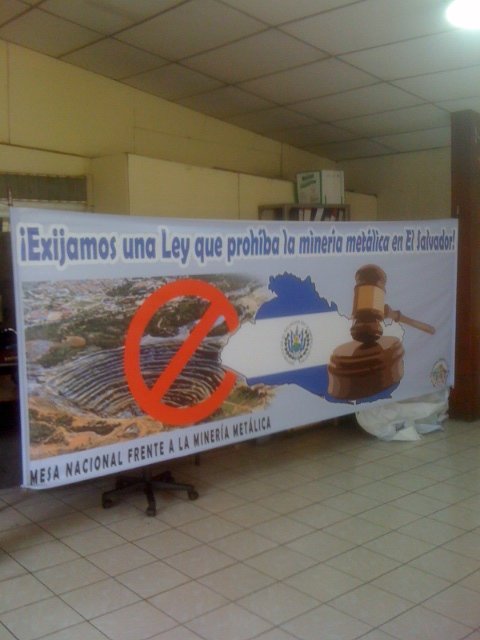Friday, July 29, 2011
Compadres reflections - Setting Context
We need to understand the struggle of Salvadorans before and during the war. It is essential that we know that over 70,000 civilians were killed over a 14-year period. This is still a nation where the injuries of this war go unresolved. There was no 'truth and reconciliation' commission here. As Miguel says, we can forgive, but never forget, but we can't forgive until we know who we must forgive.
As I reflect on how Compadres y Comadres will work in the future, I will remember always to set context. What has happened here? How does this have an impact on the present? What will the future hold?
Thursday, July 21, 2011
Wednesday, July 20, 2011
Article: CANADIAN MINING COMPANIES AND INVESTORS MAKING A KILLING
Begin forwarded message:
From: Rights Action <info@rightsaction.org>
Date: 20 July, 2011 6:15:09 PM CST
To: mcswa@rogers.com
Subject: Article: CANADIAN MINING COMPANIES AND INVESTORS MAKING A KILLING
Reply-To: info@rightsaction.org
Having trouble viewing this email? Click here
Rights Action - July 20, 2011
BELOW:
- Article: "CANADIAN MINING COMPANIES AND INVESTORS MAKING A KILLING", by Grahame Russell, in The Global Educator Journal (British Colombia Teachers for Global Peace & Education), Summer 2011: http://pagebc.ca/documents/Summer_2011_Journal.pdf)
- Link to interview with Grahame Russell: "CANADIAN MINING COMPANIES: DEVELOPMENT OR EXPLOITATION?", by Ryan Sparrow Riaz Sayani-Mulji, June 29, 2011: http://rabble.ca/podcasts/shows/progressive-voices/2011/06/canadian-mining-companies-development-or-impoverishment-an
- Please re-post & re-publish this information
- To get on-off Rights Action's listserv: www.rightsaction.org
- Join Rights Action on Facebook: http://www.facebook.com/RightsAction.org
* * * * * * * * * *
CANADIAN MINING COMPANIES AND INVESTORS MAKING A KILLING
By Grahame Russell, July 2011
The Global Educator Journal (British Colombia Teachers for Global Peace & Education) Summer 2011: http://pagebc.ca/documents/Summer_2011_Journal.pdf
On a given day, a Canadian might read the business section of her favourite newspaper or on-line news service, to check the price of gold or nickel and see how her investments are doing.
Yet, the price of metals is not only the profits they bring to company directors, shareholders and other investors, from private equity funds to pension funds like the Canada Pension Plan (CPP), but also the prices that people pay in terms of environmental destruction, harm to personal health and human rights violations.
In today's global order, where trans-national companies often operate with immunity from prosecution and accountability, shareholder and investor profits go, all too often, hand in hand with environmental destruction, harm to personal health and various human rights violations.
HUDBAY MINERALS & NICKEL MINING IN GUATEMALA:Violent evictions, gang rapes & the killing of Adolfo Ich
- The bcIMC (BC Investment Management Corporation) has $281,061,874.50, and the CPP (Canada Pension Plan) $42,000,000, invested in HudBay Minerals.
In January 2007, Skye Resources (bought by HudBay Minerals in 2008) participated in the violent evictions of a number of indigenous Mayan Qeqchi communities in the municipality of El Estor in Eastern Guatemala). These are their ancestral lands long before mining companies arrived in the 1950s, claiming "ownership".
Hundreds of huts were burned to the ground; all personal property was destroyed or stolen; community member's crops and animals were destroyed or stolen. Hundreds of families - young and old, men and women - fled into the hills and forest for weeks, before returning to rebuild their huts and replant their subsistence crops.
In one community, Lote 8, 11 women villagers were gang-raped by private security guards, hired by HudBay Minerals (then Skye Resources), and by soldiers and police. This atrocity is only recently coming to light.
On September 27, 2009, Adolfo Ich, a Mayan Qeqchi teacher and community leader in El Estor, was captured by HudBay's security guards, hacked with machetes and then shot. Hours later, family members found him dead in the company building where the security guards had dragged him.
GOLDCORP INC & GOLD MINING IN GUATEMALA:
The attempted killing of Diodora Hernandez
- The bcIMC (BC Investment Management Corporation) has $142,239,000, and the CPP (Canada Pension Plan) $177,000,000 invested in Goldcorp.
Since 2005, Goldcorp Inc has been operating a very profitable and harmful open-pit, cyanide leaching gold mine in the Mayan Mam region of western Guatemala; a mine strongly opposed by much of the local population. Since 2000, they have operated a similar mine in central Honduras, with most of the same harms and violations occurring, and with the same local opposition.
At 7pm, July 7, 2010, in the rural community of Sacmuj, two men came to the small hut of Diodora Hernández asking for coffee. As Diodora was bringing them cups of coffee, one man shot her in the right eye and ran off into the night.
Miraculously, Diodora survived. After 3 months in the hospital, she is back in her community, with a prosthetic eye, still opposing the expansion of Goldcorp's mine onto her land. Goldcorp, a Canadian-American company, acknowledged the men had worked in its mine, but deny any responsibility for the attempted assassination.
PACIFIC RIM & GOLD MINING IN EL SALVADOR:
The killing of four community members
In July 2009, the body of Marcelo Rivera, a teacher and community leader, was found dumped in a well. He had been 'disappeared' weeks before. Signs of torture were found on his body, including burn marks; he was missing toe and finger nails. On December 20, 2009, Ramiro Rivera Gomez and Felicíta Echeverría were killed. On December 26, 2009, Dora Sorto Recinos (8 months pregnant) was murdered in the community of Trinidad.
These killings occurred in the department of Cabañas, bordering Honduras, where Pacific Rim Mining Corp., a Canadian-American company, wants to mine for gold. Prevented from mining by widespread opposition, Pacific Rim is now using a World Bank "mediation" procedure to sue the government of El Salvador for $100 million in "lost profits". No one has been held accountable for the killings, neither in the World Bank "mediation" process (where murder charges can't be filed), nor in any court in El Salvador or Canada.
IMMUNITY
These abuses happen because it is Canadian public policy to push for the expansion of our mining and investor interests around the world, while opposing attempts to enact enforceable civil and criminal law standards that could be used to hold our companies and investors accountable.
North American mining companies benefit from immunity from prosecution in many countries where they operate mines - like Guatemala, Honduras and El Salvador. In the sphere of international law, they operate with immunity.
And, they operate with immunity from prosecution and accountability in Canada where the major corporate and investor decisions are made. There are no criminal or civil laws on the books to hold Canadian companies and investors accountable for harm or violations caused directly or indirectly by their business operations elsewhere.
Over the past few years, there were efforts in Canada to pass legislation - Bill C-300 - that would have provided a judicial framework for some government oversight and possible sanction (withdrawal of public funds a company might be receiving) in the case of mining company wrong-doing.
Bill C-300 would not have provided for criminal law sanctions where crimes were committed; it would not have provided for civil law sanctions, or for remedies to the victims of mining company activities if wrong doings and harms were proven. Even at that, Bill C-300 was defeated in October 2010.
Civil cases recently filed in Toronto (by Klippensteins Barristers & Solicitors) - "Choc v. HudBay Minerals" (for the killing of Adolfo Ich) & "Caal v. HudBay Minerals (for the gang rape of 11 women in the community of Lote 8) - are based on common law remedies and provide a possible crack in the Canadian wall of immunity from prosecution and legal accountability, and will need substantial political and financial support.
The DOUBLE-STANDARD
This opposition to enacting criminal and civil legislation to hold our companies accountable is self-serving and hypocritical. I wager that the mining company executives, investors and politicians who opposed the enactment of enforceable legislation swear by the values of democracy and the rule of law - just not when applied to their corporate and investment activities abroad.
Were these executives, investors and politicians victims themselves in their home communities of environmental and health and human rights violations caused by corporate activities, they would demand nothing less than full legal accountability and sanctions for the wrong doing and remedy for the harms and losses.
PUBLIC POLICY ISSUE
It is a public policy issue. Canadian governments, independent of which party is in power, support the expansion of Canadian mining and investor interests across the world, claiming that mining is good for "development", while ignoring or outright denying that Canadian companies have directly and indirectly caused harm and violations to communities around the world.
INVESTOR'S ISSUE
It is an investment issue. Investors from the wealthier sectors of society, and their private investment funds, through to a majority of Canadians with deductions paid into federal and provincial pension funds, benefit from the profits that mining companies - and other resource extraction companies and weapons producers - generate around the world.
Yet, there is little demand from investors that corporate activities be regulated by enforceable environmental, health and human rights standards.
Assurances of "responsible investing" by pension trustees and the management of bcIMC, for example, amount to little more than 'window dressing' in an attempt to hide what is really happening in the marketplace.
CULTURE AND MEDIA ISSUES
With notable exceptions, our media relegates corporate and investor issues to the business and financial pages and does not properly report on environmental destruction, harm to personal health and other human rights violations that Canadian companies can and do cause.
WHAT TO DO ABOUT UNJUST ENRICHMENT?
Most people would not, I believe, agree with unjust enrichment - the fact that their investments (private and/or public pension funds) benefit from corporate operations that are directly or indirectly causing environmental destruction, harm to personal health, and other human rights violations.
Until Canadian citizens hold our investment funds, corporations and government accountable to abide by enforceable environment, health and human rights standards, in all business and investment activities, at home and abroad, then the price of these metals will remain profitable for companies, shareholders and investors, and deadly for communities around the world.
**************
Grahame Russell is a non-practising lawyer, an Adjunct Professor in the Geography Program at UNBC (University of Northern British Columbia), and author. Since 1995, he is a co-director of Rights Action. Rights Action funds community development, environmental defense, disaster response and human rights projects in Guatemala and Honduras, in as well as Chiapas, El Salvador and Haiti.)
To learn more about these issues, in Guatemala, El Salvador and Honduras, and about the education and activism going on across Canada and the US, contact Grahame: info@rightsaction.org, www.rightsaction.org.
For more information about Canadian mining related issues and struggles around the world and in Canada: www.miningwatch.ca.
TO MAKE TAX-DEDUCTIBLE DONATIONS
for indigenous and campesino organizations defending their communities and environmental well-being from mega-"development" projects (like mining), and working for truth, memory, justice and real democracy in Guatemala and Honduras, make check payable to "Rights Action" and mail to:
UNITED STATES: Box 50887, Washington DC, 20091-0887
CANADA: 552 - 351 Queen St. E, Toronto ON, M5A-1T8
CREDIT-CARD DONATIONS: http://rightsaction.org/contributions.htm
DONATIONS OF STOCK: info@rightsaction.org
**************
1. Please re-post and re-publish this
2. To get on-off Rights Action's listserv: www.rightsaction.org
3. Join Rights Action on Facebook: http://www.facebook.com/RightsAction.org
**************

Saturday, July 16, 2011
Journey's End
This has truly been a remarkable journey. Living with the families of San Jose las Flores was transformative. There is no other word to describe this.
We have learned so much. We have written about some of what we have been taught, but there is so much we experienced sharing in the lives of these wonderful people that still needs to be voiced.
Now on to Guatemala to work on my brutal Spanish!

Sent from my iPhone
Staying with Sister Peggy
Suchitoto was one of the centers of the resistance. Over 1000 civilians were killed in a number of massacres that took place in the surrounding countryside.
Sister Peggy was part of a group of nuns that helped resettle refugees that had lived in church compounds for years In San Salvador. The hostel we stayed in is an abandoned school that has only recently been restored. Like much of the country, they are still rebuilding.
Each encounter is like peeling another layer off an onion. Our encounter with the sister was brief, but it leaves more questions. She talked briefly about the issue of youth and those who continue to leave the country for better opportunities in the North. She talked about the lack of students in the schools. She worries about the impact of the gangs and what the new Plan Pueblo Panama road will do to communities like San Jose Las Flores.
Another layer and more to learn.

Friday, July 15, 2011
In Suchitoto
The city of Suchitoto is beautiful. We met a 92 year old women who still practices the art of making Salvadoran cigars. She let me make one, but it didn't measure up to the wonderful ones she produced for us. Here in this picture you can see the church that dominates the central square. Tonight the square will come alive with music, dancing and fireworks as the town celebrates it's 137th anniversary.
We will be there!

Thursday, July 14, 2011
Day at the Sumpul
We had a terrific BBQ put on by Nelson and our translator Koki. Here you can see a few of the folks after lunch.
The highlight for me was sitting, throwing stones in the Sumpul. Interesting that such a tragic place can also be the scene of a perfect ending to a memorable week.

Wednesday, July 13, 2011
School in the forests
Between 1980 and 1986, the people who remained in this area hid in the forests to avoid the army patrols. These people had very little and they had to be ready to flee at a moments notice.
Vilma became a teacher at 12. Her future husband started teaching at 11. There were 25 kids to teach from all grades. The objective was to ensure that all kids could read and write.
Children used sharp sticks to write with and flat stones to sit on. They learned the significance if words like guerra.
The kids were well behaved. To make too much noise would attract army patrols. The parents helped by digging trenches the students could drop into when the planes came.
To illustrate the school in the forests, the Salvadoran teachers did an incredible thing. They did a role play of a class in the woods including a mock attack by the army. They used fire crackers to mimic the sound if bullets. Their drawings were pictures of helicopters shooting people.
All these people were raised in similar schools. Their commitment to teaching and learning is profound.

Sent from my iPhone
Tuesday, July 12, 2011
Katie and Susan teach English
Then the great idea- why not teach the class! Katie and Susan quickly put together a lesson on present and past simple tense.
Here is Susan at the white board in Salvatore's class. Another great unplanned encounter.

La Represion
These stories are over 30 years old, but the pain exists. They all have nightmares, they sometimes flinch when a plane or helicopter flies by. In their dreams they see dead people. The mourn for the family members they have lost.
In El Salvador, family is everything. Cousins, aunts, uncles, brothers and sisters are together all of the time to celebrate or just to be together. Maybe this is one of the reasons this is such a strong community. Everyone has lost their family, the community has become the family, they all share in the collective loss.

Chez Susan
I think we are considered regulars there now. One of the women gave each of us a papusa to try out. This is the national dish of El Salvador. Today was Katie's first and she loved it!

Monday, July 11, 2011
21st Century Learning workshop
This is how Compadres works - sharing of ideas and concepts between Canadians and Salvadorans. Very rich!
This afternoon, we are going to try to install wireless cards so the computers will all be able to access the Internet.

Our school
Today we are back at the school. In the picture below, you can see most of the classrooms. In the morning, the primary students have classes. Junior intermediate are in the afternoon.
We will be doing a workshop on computer programming this morning.

Sunday, July 10, 2011
A storm in the afternoon
- Katie

Saturday, July 9, 2011
The town square
Right now it is Saturday afternoon around six. I just took this picture. The choir is practicing for mass, the band stand is full of kids laughing and talking and the men are still playing cards.
Nice end to a very sultry day.

Our community kitchen
One of these is the comidor comunal. The community kitchen is run by the women of the town. It serves three meals a day at very reasonable prices. Most of us eat breakfast there and we all eat lunch at the comidor. We are now regulars there and we have sampled some really great food including of course papusas.
The kitchen is a very good example of how this community pulls together to prosper in a hostile environment. As we are learning, everyone over 35 has a terrible story to tell about surviving the brutality of the war. It is good that one response of the community to their sad history is to come together to share a meal.

Friday, July 8, 2011
Our first meeting
Later, we met with the teachers to go over some if the challenges they ate facing. This afternoon, we will meet to go over what we heard. The challenges include:
no spec Ed services for kids with learning disabilities
No counselling services
A need for good esl materials
No specialized programming in art physed, music, drama
There are others, but what really shines through is that these teachers will do whatever they can for their kids. Their spirit is an inspiration.
One final note - they select their own principals!

At Nelson's House

Thursday, July 7, 2011
Schools in San Jose las Flores
This is what can be achieved when people work in partnership. The next phase of this partnership starts tomorrow when the teachers at the school spend the day with us to scope out what we can do together over the next week and into the future.

In San Jose Las Flores

Concertacion des Mujeres
Rosa spoke about the consortia of women's groups that have come together to work for gender equity in El Salvador. Much work was done in marginalized communities across the country to help women and men learn the importance of treating women with dignity and respect.
In November of 2010 a law was passed by the current Government guaranteeing equality for women. The Government has begun the construction of women's health centers in rural communities. Still there is much to be done to change attitudes and practices in a society that has traditionally seen women as inferior to men. The Concertacion will continue to work on it's three main goals:
1) promotion of women's rights
2) education of women about their rights
3) development of economic initiatives to help women become more independent Tomorrow, we move to San Jose las Flores
Sent from my iPhone
Wednesday, July 6, 2011
Waking up in San Salvador
Sent from my iPhone
Tuesday, July 5, 2011
La Mineria Metalica
El Salvador's clean water resources are scarce. It is heavily deforested. It cannot afford the loss of agricultural land that would result from mining.
As a result of the Government's refusal to allow mining to go ahead, Pacific Rim, a Canadian mining company and the Commerce Group (US) are suing El Salvador for millions of dollars in lost potential profit.
In Cabanas, four environmental activists have been killed. The most recent killing took place only three weeks ago.
You have to ask, if the people and their government don't want mining on their land why is there an issue here? The people of El Salvador have the right to determine their own future. Pacific Rim should accept this and leave.
Sent from my iPhone
UCA, Romero and San Salvador
Our first day is full of memories of war. This is very important in setting context for the rest of our trip. We will be living with people who have lived through the conflict and have risen from the ashes. The community of San Jose Las Flores is living in the moment and building for the future. We need to know about the conflicts, the tragedies but we will not remain in the past, we will learn from it.

Monday, July 4, 2011
Conversations with CRIPDES
Our introductory session turned into a two and a half hour conversation that ranged from mining to child soldiers during the war to alternative models of economic development. I am always amazed at the dedication of the Salvadorans who work in organizations like CRIPDES. Both Rosa and Bernando were insurgents during the war - in Bernando's case, he was eight when he got involved.
Both talked passionately about empowering women and youth through community organizing and popular education. While a great deal has been achieved in the 390 communities where CRIPDES is active, Salvadorans face threats from mining, trade policies, water privatization and other schemes.
Miguel, our guide finally had to call this great meeting to a close - both Rosa and Bernando had to leave the city to get back to their communities.
A wonderful encounter, a great way to start.
Tomorrow, more on mining.
Sent from my iPhone
Casa Amistad
Now a quick lunch and off to a meeting with CRIPDES.

Sunday, July 3, 2011
Boarding soon
Sent from my iPhone









